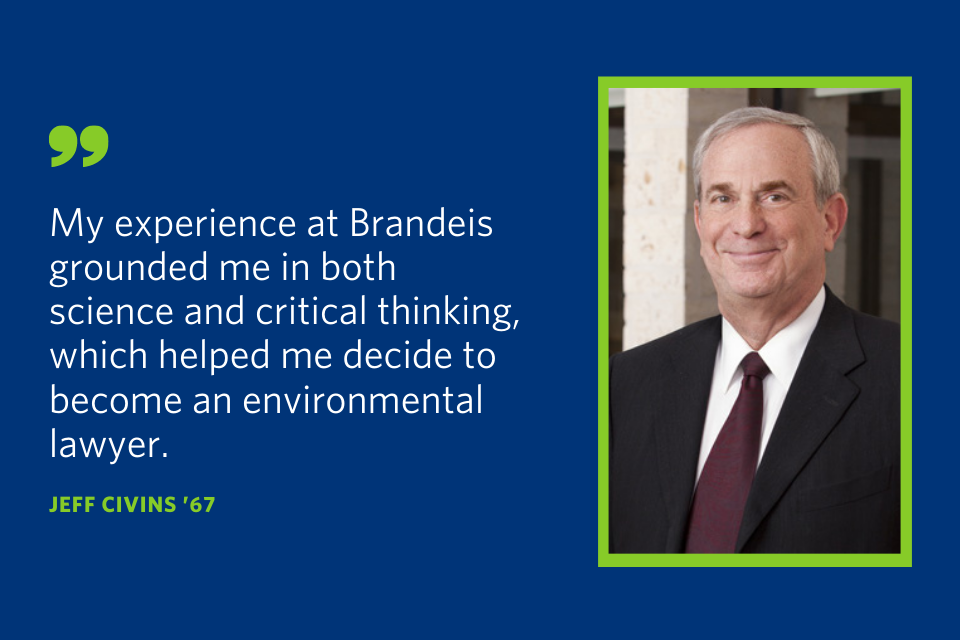Brandeis Alumni, Family and Friends
Jeff Civins ’67 Seeks Common Ground When It Comes to Environmental Protection

Jeff Civins ’67, senior counsel at Haynes and Boone, has been practicing environmental law since 1975. He is also an adjunct professor at the University of Texas Law School.
In honor of Earth Day, which marks its 50th anniversary on April 22, the Brandeis Alumni Association invited him to reflect on environmental law and other topics.
At Brandeis, I majored in chemistry and worked as a lab assistant. I pursued my interest in chemistry through two years of graduate school and then became a New York City public and private school science teacher. It made sense, therefore, when I graduated from law school that I became an environmental lawyer though it was somewhat serendipitous that I did. My experience at Brandeis grounded me in both science and critical thinking, which helped me decide to become an environmental lawyer and in my career as one.
I would say the biggest environmental law milestone in the past 50 years was the first: the establishment of the Environmental Protection Agency (EPA), consolidating federal research, monitoring, standard-setting and enforcement activities to ensure environmental protection. Since then, the enactments of each of the federal pollution statutes — the Clean Air and Water Acts, the Resource Conservation and Recovery Act, and Superfund — were all significant in regulating the releases of pollution into our air and water and onto our land. But the decision of the U.S. Supreme Court in Massachusetts v. EPA — which affirmed that the regulation of greenhouse gases was within the scope of the federal Clean Air Act — may have been the biggest because of the message it sent, rather than the regulatory actions that it engendered.
I think corporations were moving in the direction of sustainability before the current crisis. The recent pledge by major companies to protect the environment through sustainable business practices and their acknowledgment that they are responsible to all their stakeholders, not merely their shareholders, was the latest milepost on an evolution of corporate culture. From a focus on environmental compliance to risk management to environmental sustainability, companies have come to recognize that being environmental stewards, protecting the environment, is both appropriate and good for business. This crisis may have accelerated this transition. Among other things, the crisis should have created an awareness for corporations, and others, that there are less environmentally impactful ways of conducting business, that identifying and planning for worst-case scenarios is critical, and that our economy, including our supply chains, is linked to what happens in the rest of the world.
The lockdown arising from the pandemic has resulted in less travel and related pollutant-emitting activities and a realization that remote working and virtual meetings are more viable than we perhaps previously realized. The result may be a more sustainable way we do business. On the other hand, the lockdown has made it more difficult to conduct business and to comply with pertinent laws. On a global scale, the pandemic has made clear that we are all members of a global community and that what happens in one part of the world, like the release of a virus or of greenhouse gases, may have a global effect. It also has brought home the need to focus on the interrelationship between man and the environment, including in particular, with animals that likely were the source of the COVID-19.
This crisis has literally brought home the fact that world is interconnected — for both good and bad. As a consequence, we all need to be proactive members of the international community, to be able to detect threats as well as to be able to identify scientific and other opportunities for making our world a better place to live.
I encourage Brandeis students to be willing to think big and outside the box and to forcefully advocate for your positions, but embrace a spirit of civil dialogue around environmental issues. Be willing to talk with those whose perspectives differ from yours: explore goals on which you can agree and discuss how best to achieve those goals. Regardless of where people stand on the political spectrum, presumably there’s much they can agree on, for example: reducing the quantity and toxicity of waste, conserving natural resources and water, building an adequate infrastructure to manage potable water and wastewater, and making energy available while protecting the environment. Recognize that environmental dialogue and decision-making should be based on science and fact, not political ideology.
Read additional Earth Day reflections from Brandeis alumni.
Published On: April 20, 2020






